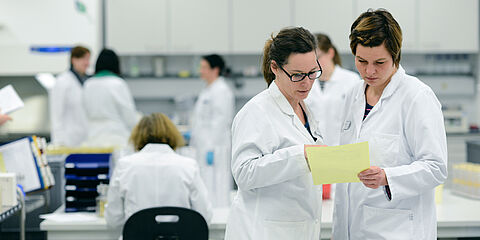How our body processes moulds in food
How does our body process mould toxins ingested with food? Jonas Specht, food chemistry student at the Westfälische Wilhelms-Universität (WWU) Münster, was recently granted the Study Award for the best master's thesis in the field of food chemistry for his outstanding master's thesis on this topic by WESSLING. This is the fifth time we awarded the prize, which is endowed with 1,000 euro.

Moulds produce toxins, so-called mycotoxins. These include ochratoxin A, which Jonas Specht examined in detail for his master's thesis. This substance can be found in mouldy foods, for example, and pose a health risk. It is known that ochratoxin A can damage kidneys, and possibly even causes cancer. "Jonas Specht's study convinced the jury because so far little was known about how our body deals with toxins such as ochratoxin A", explains Andreas Finger, Head of the Food and Consumer Products Division at WESSLING and lecturer at WWU. "We know that the body converts toxins into other substances in order to be able to excrete them via urine, for example. How exactly these conversion processes work, however, has hardly been researched so far."
Jonas Specht's master thesis, therefore, provides an important basis for further research approaches. In the laboratory, he has synthesised some of the substances that the body could produce from ochratoxin A. Using a newly developed method, he found one of these substances in the urine of test persons and thus proved that it is produced by the human body during metabolism – an important step towards a scientific understanding of how our body deals with toxins. For his work, Jonas Specht has used a comprehensive range of methods, from chemical synthesis to in vitro models and a human study.
Promoting young talent at multiple levels
WESSLING is committed to promoting young scientists through close contact with universities and universities of applied sciences. The transfer of knowledge from theory to practice is also promoted through internships and positions for master's and bachelor's theses. Jonas Specht was also able to apply his theoretical knowledge during his internship at WESSLING. In addition, our experts participate in research and development projects and work in various DIN and technical committees.
Your contact
- Pia Hustert
- +49 2505 89-0
- pia.hustert@wessling.de
„We will be happy to help you if you would like to know more about WESSLING or our wide range of specialist topics.“



